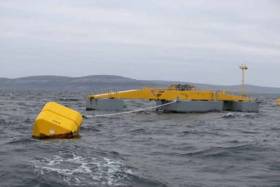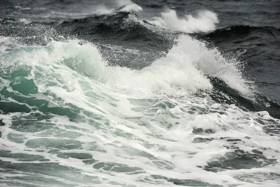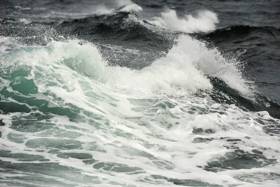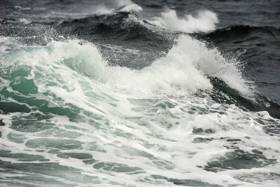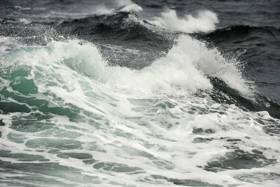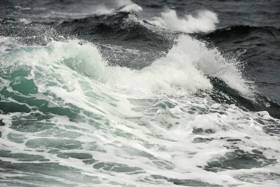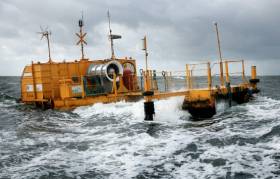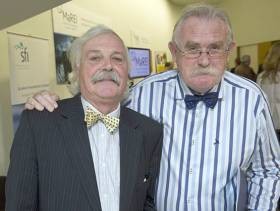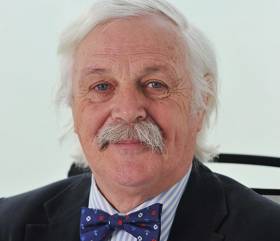Displaying items by tag: Ocean Energy
Irish–Designed SeaPower Device Survives Winter at Sea off Galway
An Irish-designed device to generate electricity from ocean wave power is another step closer to breaking into the massive potential on offer in the ocean energy market.
Irish company, Sea Power Ltd., has concluded the winter survivability testing programme of their prototype wave energy device at the Galway Bay Marine and Renewable Energy Test Site. In the coming week the device will be removed from the test site and brought back into Galway Docks.
This is a significant advance for the eight-year project, which has been a collaboration between Sea Power Ltd., SmartBay Ireland, the Sustainable Energy Authority of Ireland (SEAI) and the Marine Institute. Following successful testing at small scale, the company, progressed to quarter scale testing in open sea conditions in Galway Bay for the first time last October.
Wave energy devices, such as the Seapower Platform, will ultimately harness the extraordinary power of the waves off Ireland’s coast. The success of Sea Power at sea has brought Ireland closer to sharing in the future growth, job and low-carbon rewards that ocean energy can bring to coastal communities in the West of Ireland.
Commenting on behalf of SEAI Declan Meally, Head of Emerging Sectors said: “It’s very encouraging to see innovative Irish ocean energy technologies progressing through the country’s testing facilities. Companies such as Sea Power Ltd could provide the solution for unlocking the huge renewable energy potential that our oceans can provide. While progress will take some years yet before commercial solutions are available, it is through testing and development that Ireland is showing leadership in this sector.”
The National Offshore Renewable Energy Development Plan (OREDP) approved by Government in 2014 outlines the vision and goals for development of the offshore renewable energy sector in Ireland. This identified a potential of up to 50,000 jobs generated in Ireland by 2050. Many of these could be realised along the west coast in future years.
Peter Heffernan, Marine Institute CEO said: “Sea Power Ltd is a great example of an indigenous Irish company developing novel technology to harness the power of the ocean. Having brought their device through various small scale prototypes, it is exciting to see this new technology successfully testing over the winter months in the sea at quarter scale.”
SEAI and the Marine Institute are working together to develop Ireland’s ocean energy testing infrastructure which includes tank testing facilities at Lir National Ocean Test Facility in Cork, the consented quarter scale test site in Galway Bay and the planned full scale Atlantic Marine Energy Test Site off the Mayo coast.
The Galway Bay Marine and Renewable Energy Test site has been in operation since 2006 and is currently licensed to operate until 19th March 2017. In line with the Government’s Offshore Renewable Energy Development Plan, the Marine Institute applied in April 2016 for a new foreshore lease to allow testing of a wider range of marine renewable energy devices to provide researchers and those involved in developing ocean energy devices with a world class permitted area in which to safely test and demonstrate quarter-scale prototype ocean energy converters and related technologies. No determination on this application has been received from the licensing authority to date.
The Seapower Platform will be removed from the test site by the 19th March and no further testing will be completed until a new lease is authorised. A decommissioning plan for the cessation of current test site activity has been agreed with the licensing authority, details of which are available on www.marine.ie The Marine Institute has committed to ongoing monitoring of the marine environment within the test site area to ensure no adverse impacts arise from the cessation of testing activities.
Locals Express Fears As Deadline Draws Near On Galway Bay Marine Test Site Consultation
#SeaPower - Fears over loss of access to generations-old seaweed harvesting grounds and millennia-old archaeological finds have been expressed by locals in the consultation on the new Galway Bay Marine and Renewable Energy Test Site, which closes next Friday 9 September.
According to The Irish Times, community activists in Spiddal have accused the State agency responsible of a "lack of transparency" over its intentions for a long-term lease over the foreshore site on the Connemara coast that's already home to the new SmartBay observatory.
Locals have also expressed concerns that the new facility would be used for power generation and not just for testing of quarter-scale prototypes, that it would cover an area some "30 times the size of Croke Park", and that the main test wind turbine would reach a height of 35 metres.
"We run a regatta in Spiddal every year of Galway hookers and it is right on the line of the regatta," said an organiser of the public meeting held in Spiddal last Monday 22 August. "There was no environment impact statement; there was no consultation with the likes of us."
#SeaPower - The public consultation period for the Marine Institute’s foreshore lease application to upgrade the Galway Bay Marine and Renewable Energy Test Site has been extended once more, until 5pm on Friday 9 September.
This latest extension follows the public meeting on Thursday 21 July in the Connemara Coast Hotel, during which some participants requested more time to allow informed submissions on the lease application.
It also comes after complaints from Galway West TD Catherine Connolly over a lack of response from Local Government Minister Simon Coveney over the issue, as the Galway Advertiser reports.
The meeting was the third public meeting held as part of the consultation on the foreshore lease application to upgrade test and demonstration facilities at the Galway Bay Marine and Renewable Energy Test Site.
The Marine Institute applied in April to the then Department of the Environment, Community and Local Government for a foreshore lease for the site where prototype marine renewable energy technology can be tested at reduced scale to determine viability in an ocean environment.
All relevant documents remain on viewing until the new deadline.
Some 25 submissions have been received as of the previous deadline of 2 August, according to Galway Bay FM.
SmartBay Shares In Euro Funding For Ocean Energy
#SmartBay - Galway's new SmartBay ocean observatory will share in a €11m European funding boost for ocean energy testing, as Silicon Republic reports.
The subsea observatory in Galway Bay – launched earlier this month in tandem with SeaFest and the Our Ocean Wealth Conference – is included along with projects in the UK, France and the Netherlands under the Funding Ocean Renewable Energy through Strategic European Action (FORESEA) programme.
SmartBay has been conceived to support the testing of quarter-scale prototypes of ocean energy devices alongside its ocean data collection capacity, which lowers the cost barriers for commercial research and development in the growing sector. Silicon Republic has more on the story HERE.
The news also comes after the signing of an energy co-operation declaration with nine other EU countries focusing on the development of wind and ocean energy, as previously reported on Afloat.ie.
Public Meeting In Connemara On Galway Bay Marine Test Site
#SeaPower - The Marine Institute will host a third public information meeting on the Galway Bay Marine and Renewable Energy Test Site next Thursday 21 July at 7:30pm in the Connemara Coast Hotel in Furbo, Co Galway.
The meeting is part of the public consultation to ensure full information is provided on the Marine Institute’s foreshore lease application to upgrade test and demonstration facilities at the Galway Bay Marine and Renewable Energy Test Site.
The Marine Institute and the Sustainable Energy Authority of Ireland will provide information on the background to the lease application and the scope of the proposed upgrade and address questions raised by the public ahead of the new deadline for submissions, which is Tuesday 2 August.
As previously reported on Afloat.ie, the application document and relevant maps, plans reports and drawings are available from the Department of the Environment's website, and are also available for viewing in Salthill and Spiddal till the deadline. Information on the consultation is also available in Irish.
Extension To Public Consultation On Galway Bay Test Site
#GalwayBay - The public notice period for the Marine Institute’s foreshore lease application to upgrade the Galway Bay Marine and Renewable Energy Test Site has been extended by two weeks to Friday 1 July 2016.
Following representations to the Foreshore Licensing Unit from locals and the Marine Institute, Planning Minister Simon Coveney decided this week (Wednesday 15 June), as an exceptional matter and in the public interest, to extend the period by which submissions from members of the public for the above application can be submitted by a further 10 working days.
The new extended closing date by which submissions must be made is now close of business on Friday 1 July. Submissions received after this date will not be taken into consideration.
Further information on the application will be made available early next week in order to address queries raised during a well attended public information meeting in Spiddal last Tuesday 14 June.
The Marine Institute applied to the Department of Housing, Planning and Local Government (formerly the Department of the Environment, Community and Local Government) for a foreshore lease for the Galway Bay Marine and Renewable Energy Test site where prototype marine technology can be tested at reduced scale to determine viability in an ocean environment.
Observations are invited on the foreshore lease application which outlines plans to upgrade the existing infrastructure and facilitate the deployment of a wider range of marine renewable energy devices and novel sensor technologies at the Galway Bay Marine and Renewable Energy Test site.
The Galway Bay Marine and Renewable Energy Test Site has been in operation since 2006, when it was established by the Marine Institute and the Sustainable Energy Authority of Ireland. The purpose of the site is to allow technology innovators to test the viability of small scale prototypes in an ocean environment.
A copy of the application and all relevant maps, plans, reports and drawings are available to download from the departmental website. Copies of these documents are also available for viewing at Salthill Garda Station, Salthill, as well as Spiddal Public Library and Comhlacht Forbartha An Spidéal Teo in Spiddal until 5pm on 1 July 2016.
Should you wish to make a submission on the lease applications you should do so in writing no later than 5pm on 1 July 2016 (quoting ref: FS 006566) to the Foreshore Unit, Department of the Environment, Community and Local Government, Newtown Road, Wexford or [email protected].
#PowerFromTheSea - Ireland could be central to the mainstreaming of ocean energy over the next 35 years, according to a new report from the emerging industry.
As The Irish Times reports, the Marine Renewables Industry Association (MRIA) maintains a healthy outlook for the development of wave and tidal energy projects despite revising its predictions for the next decade.
Though "technical challenges" remain in offshore renewables for both wave and wind power generation, Ireland has been marked for "generally strong" policy in the area – and has been encouraged to work with Scotland towards closing the funding gap between research and commercial application.
That view chimes with news from the Maritime Journal, which says Ireland's marine energy market could be worth €15 billion by 2050.
Singled out for its significant contributions in the sector is the SFI Research Centre, Marine Renewable Energy Ireland (MaREI) at University College Cork (UCC), which also houses the Lir National Ocean Test Facility.
That's one of a number of Irish 'innovation hubs' involved in exploring the potential benefits of ocean energy, as previously reported on Afloat.ie – and as discussed at the recent symposium of marine energy leaders in Cork.
Marine Journal has much more on the story HERE.
Seascapes Podcast – Ocean Energy Father Honoured
Hello and welcome aboard this week’s edition of your maritime programme ... this weekend on Saturday and Sunday - Dive Ireland 2016 the Annual conference hosted by the Irish Underwater Council and Athlone Sub Aqua takes place in the Hodson Bay Hotel in Athlone with a panel of experts speaking on a wide range of topics and a large selection of exhibitors showing their wares; also in Galway the Skipper Expo which began earlier today runs until Saturday afternoon in the Galway Bay Hotel in Salthill – Seascapes will be attending both events and hope to meet up with you there...
First on Seascapes this week... to an event held in the maritime hub of Cork Harbour earlier this week – titled the Lewis Symposium the two day event honoured Emeritus Professor Tony Lewis of University College Cork considered to be the father of Ocean Energy in this country ...let’s hear first from Professor Sarah Culloty of University College Cork, Head of School of Biological, Earth and Environmental Sciences and Director- Environmental Research Institute...
Marine Renewable Energy Leaders Convene In Cork
Global leaders in the field of marine renewable energy are in Cork today (Monday) to attend a two-day symposium in honour of the ‘father of ocean energy’, Professor Tony Lewis. The Lewis Symposium, hosted by the MaREI Centre for Marine and Renewable Energy, is being held in recognition of the significant contributions made by Professor Tony Lewis to the field of Ocean Energy.
Listen to the podcast with Tony Lewis here.
“The Lewis Symposium is a celebration of a man who has dedicated his entire career to marine renewable energy. Professor Lewis has been one of the most active members of the Ocean Energy community for the past 4 decades. Through his teaching, research, industrial and ambassadorial roles he has become a great influencer in the Marine Renewable Energy (MRE) sector – which is why so many of his contemporaries have travelled to Cork for this event honouring him,” said Prof Jerry Murphy, Director MaREI.
“His legacy includes the MaREI Centre for Marine and Renewable Energy, which has over 130 researchers across 6 institutions working with 45 industry partners, and the Lir National Ocean Test Facility located in the new world-class Beaufort Building,” he added. “Tony saw the potential of our marine resource before many others and was instrumental in developing the MRE sector here.”
Speaking at The Lewis Symposium, Professor Tony Lewis said: “Over the course of my career I have been privileged to have worked with people from all over the world who are researching and making real progress in the marine renewable energy sector. One person in particular, Prof Stephen Salter, has been a real inspiration to me for a very long time – I am honoured that he, and so many of others, have travelled to Cork to celebrate what we have achieved so far,”
“With a sea to land ratio of over 10:1, Ireland is one of the best locations in terms of marine renewable energy resources, but it is only in the last 10 years that we have started to get serious about the potential of marine renewable energy. I am honoured to have played a part in that and I look forward to the continued collaboration with my colleagues in Ireland and across the world,” he added.
As a result of his achievements Professor Lewis has recently been awarded Professor Emeritus status in University College Cork.
Speakers and attendees will be treated to a tour of the world-class UCC Beaufort Building which houses the MaREI Centre for Marine and Renewable Energy and the LIR National Ocean Test Facility. The building was officially opened in July 2015, representing an investment of €15.2 million from the Irish State and private investment. The Building covers some 4,700m2 on five floors and has provision for 135 researchers and support staff in offices and across a suite of state-of-the-art test tanks and dedicated workshops.
The Beaufort Building, located adjacent to the National Maritime College of Ireland, is a major extension of UCC’s Environmental Research Institute (ERI). MaREI and the Lir National Ocean Test Facility are part of the IMERC Cluster, a strategic initiative by UCC, Cork Institute of Technology and the Irish Naval Service which has been successful in promoting Ireland as the place to invest in the maritime and energy sectors.
Ocean Energy, Angling & Fishing Expo in Seascapes Podcast
Hello and welcome aboard this weeks edition of your maritime programme, we have music from Molgoggers, we preview the Lewis Symposium presented by MaREI – Ocean Energy; Theory, Practice and Integration hosted by the Environmental Research Institute Beaufort Building, University College Cork by visiting the Seascapes archive and hearing from Emeritus Professor Tony Lewis ....the remarkable HMS Caroline the Battle of Jutlands only afloat survivor in Belfast soon to open as a heritage visitor attraction, Fergal Keane visits the annual Angling Expo in the National Show Centre held last weekend ..... and our competition for copies of “This Is the Burren” by photographer Carsten Krieger courtesy of The Collins Press; ....First here on Seascapes to the Raidio na Gaeltachta Studios in Derrybeg near Gweedore to hear from Hugh Bonner of Mara Media who publish The Irish Skipper and host the Skipper Expo with over one hundred exhibitors in Galway next weekend on Friday 4th and Saturday 5th March at The Galway Bay Hotel...
The Winter lecture 2015/16 season of the Glenua Sailing Centre continues with a double lecture programme at the March meeting entitled: ‘The Sea From Two Perspectives’.
The illustrated lectures will take place on next Thursday 3 March (20:00hrs) at the Poolbeg Yacht & Boat Club, Ringsend, Dublin. There will be an entry fee of €5 in aid of the R.N.L.I
The first lecture, “Art and The Sea - An Enduring Fascination” will be given by Jessica O’Donnell who is Collections Curator at Dublin City Gallery The Hugh Lane. Jessica is a graduate of Trinity College, Dublin and the University of St Andrews.
Jessica’s talk will explore how artists have been captivated by the sea from many perspectives including how the Impressionists loved portraying people at leisure by the sea; how safeguarding the freedom of the seas was represented in artworks commissioned as war time propaganda; to contemporary artists whose fascination with the sea and marine life continues to inspire.
The second lecture is entitled, “Putting Eyes In The Deep Ocean” by Dr Fiona Grant, Ocean Science & Information Services (OSIS), Marine Institute, Ireland. Fiona began her studies in geology before going on to specialise in marine geophysics and earth system dynamics. Her first job was as conservation coordinator for wild salmon and sea trout before taking responsibility for research infrastructures in the Marine Institute.
Dr Fiona Grant will focus on some of the challenges in observing the deep ocean environment, how to harness ocean energy in Galway Bay and present some of the latest results from studies in the Atlantic Ocean.....
The annual Ireland Angling Show was held in the National Show Centre in Swords in Dublin last weekend. ..........Fergal Keane went along for Seascapes.
Hi Marcus,
It's nearly 3 years since you put out a call on Seascapes to help us find people who had built IDRA 14 dinghies in the past or had plans that we didn't know about.Well, we're now coming towards the end of our project! We did meet with some listeners to your programme, who got in touch during that time and visited our project. Thought you might like to know how we're doing.
As we enter into the 70th anniversary year of the IDRA 14 Dinghy, we're delighted to be able to announce the launch date for the new wooden clinker-built IDRA 14 dinghy, being built in Clontarf, the first to be built in well over 35 years.
Look at it now............Riveting completed, floor bearers in place, spinny shute in place, foredeck on - we're ready now to put the deck on and close up the boat! :-) Find out more in our latest update.
Next to Emeritus Professor Tony Lewis of University College Cork , back in October of last year we were in Croke Park for an Ocean Energy Conference and we spoke to Tony ...
On Monday and Tuesday the Environmental Research Institute Beaufort Building hosts MaREI –The Lewis Symposium on Ocean Energy : Theory Practice and Integration at the National Maritime College of Ireland .....speakers will include Professor Tony Lewis ; Eoin Sweeney on Marine Renewables in Ireland ; Professor Stephen Salter , Emeritus Professor University of Edinburgh ; Professor Trevor Whittaker , Queens University Belfast on the Industrial History of Ocean Energy and Professor Alistair Borthwick , University of Edinburgh on tides and Tidal Power , we’ll have more detail on the speakers and topics at the Lewis Symposium and we’ll have a full report on Seascapes next week....,.
The War at Sea is rarely considered when discussing the impact of the First World War but, although it involved far fewer men on the front line, keeping the seas safe and the vital supplies flowing to feed the Army and the people of Britain and Ireland cannot be overlooked. From across Ireland over 10,000 men served in the Royal Navy, but many tens of thousands more served in the merchant fleet, continued to fish despite the hostile submarine threat, provided essential rescue services off our coasts and maintained the essential industries directly linked to the sea.
31st May 2016 is the Centenary of the Battle of Jutland, which was the most significant naval engagement of WW1. This is the chosen date to mark the contribution of all involved in war and life at sea 1914 – 1918 with a Commemoration to the Irish Sailor in the Great War. The event will be run in Belfast next to Jutland’s only afloat survivor, HMS Caroline, and will include her official opening as a heritage visitor attraction. The commemoration will connect people in maritime activity a hundred years ago with descendants, and to those engaged in similar activity today.


























